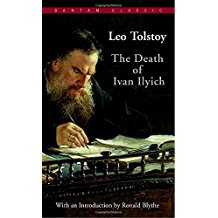The Death of Ivan Ilyich, Leo Tolstoy, 1886, translated by Ian Dreiblatt, 2008
Tolstoy’s classic novella about a judge whose illness (almost certainly some form of GI cancer, perhaps pancreatic) proceeds inexorably to his death in his mid-40’s, a dying that is denied by all around him except in so far as they view it as an opportunity for professional advancement or family change. The only ones who are sensitive and tuned in to his situation are Gerasim, the peasant servant, who acknowledges that he is dying and is willing to do whatever he can to ease his way, and his son who at 14 is too naïve to pretend. Ilych Golovin on his deathbed realizes that his entire life has been false, lived according to the expectations of society and his peers. As Tolstoy says in the first line, “In its details the life of Ivan Ilytch was the most simple the most ordinary and the most horrible.” So how is one to live, Tolstoy might ask the reader? His solution is clearly the religious one, but we moderns are asked to find meaning in our own way (Teshuvah, Tzedakah, and Tukin Olam is one solution, but then we’re just turning from the Christian to the Jewish solution). Another theme is the one raised by Gawande in Being Mortal, i.e. how to help each other with the quintessentially human challenge of mortality. A classic tale.



